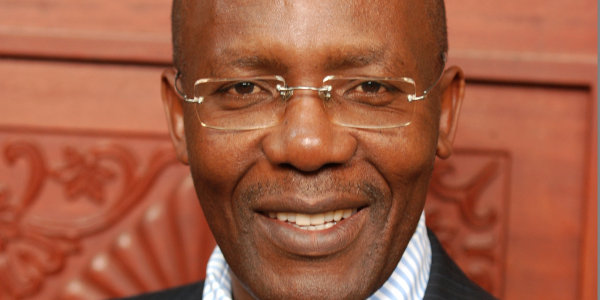 |
| Gov. Aregbesola |
In a bid to cushion the effect of the current economic downturn on the residents and government occasioned by the dwindling revenue from the federation account, Osun State government has renewed its commitment and called on the people to embrace farming as the only alternative way out.
Governor Rauf Aregbesola recently noted at a gathering that the situation with the drop in oil prices and the sharp reduction in the federation accounts from N1.2 trillion in 2012 to N369 billion in November allocations shared in December 2015 has reduced the running of government to little or nothing hence, the need to look inward in increasing IGR.
Apart from measures government is taking to revive the state’s economy, Governor Aregbesola further promised the readiness of his administration to render assistance to young graduates and people having interest in agriculture.
Recently, the state government signed a Memorandum of Understanding (MoU) with the International Institute of Tropical Agriculture (IITA) for the establishment of a demonstration farm at Ago Owu Farm settlement in the state for best farming practices.
The state government, in the agreement, would make available 20,439 hectares of land at the farm settlement for the development of agriculture and production of massive food as alternative to reliance on the oil sector.
The demonstration farm centre is also for the purpose of conducting research and training young farmers in the state in modern, commercial and profitable farming. Under the agreement, the IITA will also carry out cassava, plantain and other crop multiplications.
Besides, the state late last year signed $50million Agriculture Investment with a United States of America (USA) firm for the provision of modern agricultural technological services, aimed at giving fresh impetus to its agricultural sector revolution drive in the state.
The MoU covered the development and infrastructural upgrade of breeding, fattening and processing of beef cattle ranches and the establishment of agricultural equipment leasing and hire centres to be managed by JIL farm Limited.
The government has also promised to reinvigorate the bee keeping business in the state to keep the youth especially young graduates as well as women busy and get them out of the problem of seeking none existing white collar jobs.
Speaking on the determination and commitment of the state government to boost agriculture, the National Coordinator of Federation of Bee Keeping Association of Nigeria (Southwest), Mr Femi Komolafe said that the state government is doing everything possible to reinvigorate agriculture as one of the strategies needed to transform the state.
Komolafe, an expert in bee keeping and one of the aides to Governor Aregbesola stated that aside from massive food production and generation of revenue from cash crops; the state is focusing on bee keeping.
He stressed that the state government has created a honey processing centre at Oyan, in Odo-Otin local government area of the state to standardise processing of honey to meet international specifications now that the world has discovered that African honey is the best organic honey from nectars of flowers.
According to him, “the world is looking for African honey this time around because they have discovered that it is the best because we are producing organic honey. It is honey that does not strive with sugar or any other thing. It is natural substance that was gotten from nectar of the flowers of the plants. So it is more nutritious than any other honey from other parts of the world.”
While stressing on the importance of honey, Komolafe noted that bee keeping business is generally acceptable worldwide unlike some agricultural produce such as piggery which is not embraced globally.
His word: “honey has been recommended as complete food that contains protein, carbohydrate, vitamins and the rest adding that there are lots of benefits from honey which makes it a veritable business.”
He emphasised that the state has made huge investments in processing of honey and other beehive products and intends to encourage the bee farmers in the state to process their honey in a modern way that would be able to match the international standard and make it exportable.”
“The Standard Organisation of Nigeria (SON) has also stepped up campaign on the processing of honey because it was discovered that most people that have been producing honey in the past are doing it in a crude manner that makes it not exportable.”
“For the processing of honey to be actualised in the state, we have designed a programme of mobilising more people into the honey business, encouraging them to produce more so as to meet the supply of honey and supply other bee products.”
“Arrangements have been put in place to organise seminar even for the existing bee keepers within the state of Osun and at the same time to encourage more people who are fresh to come into the business. Bee keeping is not a business that is difficult to learn. It is so easy to learn and manage, once you know the rudiments of handling the bee and managing apiary, the sky is the limit for anybody that goes into the business.”
“Apart from organising seminars, encouraging more people into the sector, we try to make sure that in each local government, the bee farmers organise themselves into cooperative bodies either having individual or joint farms in order to have access to funds from the Bank of Agriculture (BOA) and Bank of Industry (BOI).”
Komolafe explained that the state government has opened up windows of opportunities to all interested bee farmers in the state with the processing factory created at Oyan in Odo-Otin local government area of the state to mop up all the products and process them for export.
He declared that Beekeeping is a business that does not require more money to start unlike poultry and other agricultural business.
According to him, “Bees require no feeding; what they require is the house, where to house or hive the bees. We are so fortunate in this part of the world that we have vegetation and flowers that bees always exploit (the nectars). The nectar from flowers is what the bees always gather to make the honey.”
Unlike in the temperate region where they need to feed their bees, we don’t have that problem in this part of the country because we have enough vegetation that can give flowers at different period. It is from the nectars that the bees acquire what is needed to form their honey and other bee products.”
Also, Governor Aregbesola recently hinted of his plan to establish a Commodity Board that will ensure that Osun ranks among the best cocoa producers in Nigeria within the next two years.
Meeting with produce merchants in the state recently, Aregbesola stated that with the new cocoa development initiatives in the state, fresh revenues will be available to the state thus making the economy of the state prosperous in 2016.
The governor noted that the state will soon bounce back with the identification of 60 million Cocoa trees presently in the state, adding that government henceforth will criminalise any action of farmers and merchants that runs afoul of government laws on cocoa.
He pointed out that government will soon be registering all farmers in the state for easy implementation of government policies on agriculture thus giving adequate room for monitoring and giving the necessary support for farmers.
According to him, “To show the people of the state that we are ready to face agriculture squarely in Osun, I am establishing a Commodity Board that will be supervised directly from the office of the governor.”
“Our bags of cocoa in Osun will be branded; government will be able to ensure that the quality of cocoa coming out of the state meets international quality standards. When there was free money coming from oil, no government was looking at what cocoa could bring to the economy; we are back to the days where cocoa will be the main stay of our economy in Osun.”
Aregbesola hinted that produce tribunals will be set up across the state and that a special colour will be given to vehicles transporting cocoa within the state.
The governor reminded produce merchants of the immense wealth that cocoa alone brought to the Western Region and the good use to which the revenues were put by the then governments.
Meanwhile, the managing director of Osun Investment Company, Alhaji Bola Oyebamiji disclosed recently that the company alone has cultivated no fewer than 1,500 hectares of cocoa at Ibokun in Obokun local government area and Iwo in Iwo local government area of the state all in an attempt to boost the economy of Osun State.
The old Western Region under the administration of the late sage, Chief Obafemi Awolowo made landmark achievements in the region without oil but relying on agricultural produce. Aregbesola is ready to follow suit.
Source: Leadership







